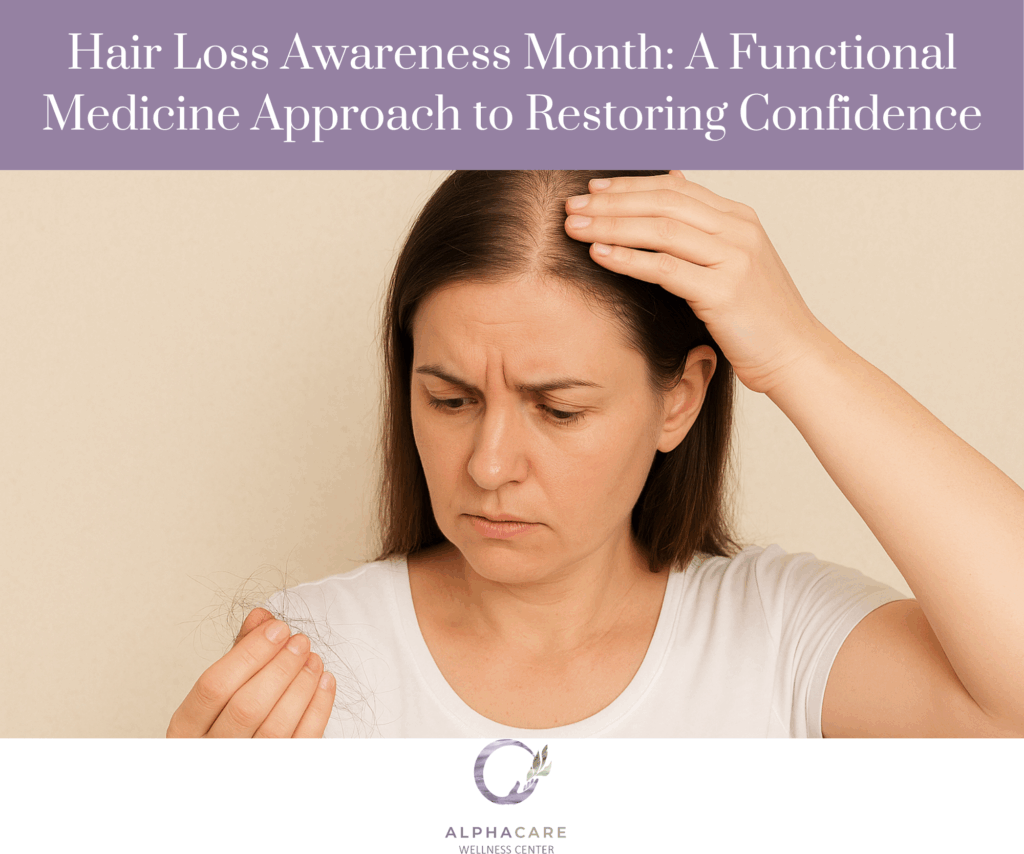
Introduction
Hair loss impacts nearly 80 million Americans, and while it’s often seen as just a cosmetic issue, its effects on confidence and well-being can be profound. The causes are varied—ranging from genetics to stress—and while topical treatments and medications can provide short-term help, they don’t always explain why the problem is happening. This August, Hair Loss Awareness Month, AlphaCare Wellness Center invites patients to take a deeper look at the root causes of hair loss and consider how integrative solutions can help restore not only hair health, but also self-confidence.
Common Causes of Hair Loss
Hair thinning or shedding often results from a combination of factors:
- Genetics: Androgenetic alopecia (commonly known as male or female pattern baldness).
- Hormones: Thyroid disorders, PCOS, or shifts related to menopause.
- Nutrient Deficiencies: Low levels of iron, zinc, vitamin D, and inadequate protein.
- Stress and Cortisol Imbalance: Chronic stress may trigger telogen effluvium, where hair enters a shedding phase.
- Autoimmune Conditions: Disorders such as alopecia areata, where the immune system attacks the hair follicles directly.
Conventional Options
Dermatologists often recommend conventional treatments, including:
- Minoxidil (Rogaine®) to stimulate growth.
- Finasteride (primarily for men) to reduce hair loss progression.
- Hair transplant surgery for advanced cases.
These approaches can provide temporary relief or cosmetic improvement but often fail to address the underlying reasons for hair loss.
Functional Medicine Interventions
At Alpha Care Wellness Center, we focus on identifying what’s driving the imbalance and targeting those factors directly. Strategies may include:
- Comprehensive Lab Testing: Evaluating thyroid function, hormone balance, ferritin, vitamin D, and inflammation markers.
- Nutrition for Hair Growth: Prioritizing protein, B-vitamins, collagen, and omega-3s to give follicles the raw materials they need.
- Stress Reduction: Incorporating meditation, breathwork, and mindfulness practices to lower cortisol and protect follicle cycles.
- Therapies for Stimulation: Using red light therapy, PRP (platelet-rich plasma), and microneedling to help activate and strengthen hair follicles.
Daily Habits to Protect Hair Health
Small, consistent lifestyle changes can help protect hair and scalp health:
- Avoid tight hairstyles that place strain on the scalp.
- Use gentle, sulfate-free shampoos to minimize irritation.
- Apply natural oils like rosemary or peppermint to support circulation to the scalp.
- Maintain proper hydration and prioritize consistent, restorative sleep.
Q&A Section
Q: Is hair loss reversible?
A: In many cases, yes. If the underlying cause—such as a nutrient deficiency or hormonal imbalance—is identified and corrected early, hair regrowth is possible.
Q: What’s the best first step if I notice thinning hair?
A: The most effective place to start is with testing, which helps uncover whether nutrient, hormonal, or autoimmune factors are contributing to hair loss before starting treatments.




